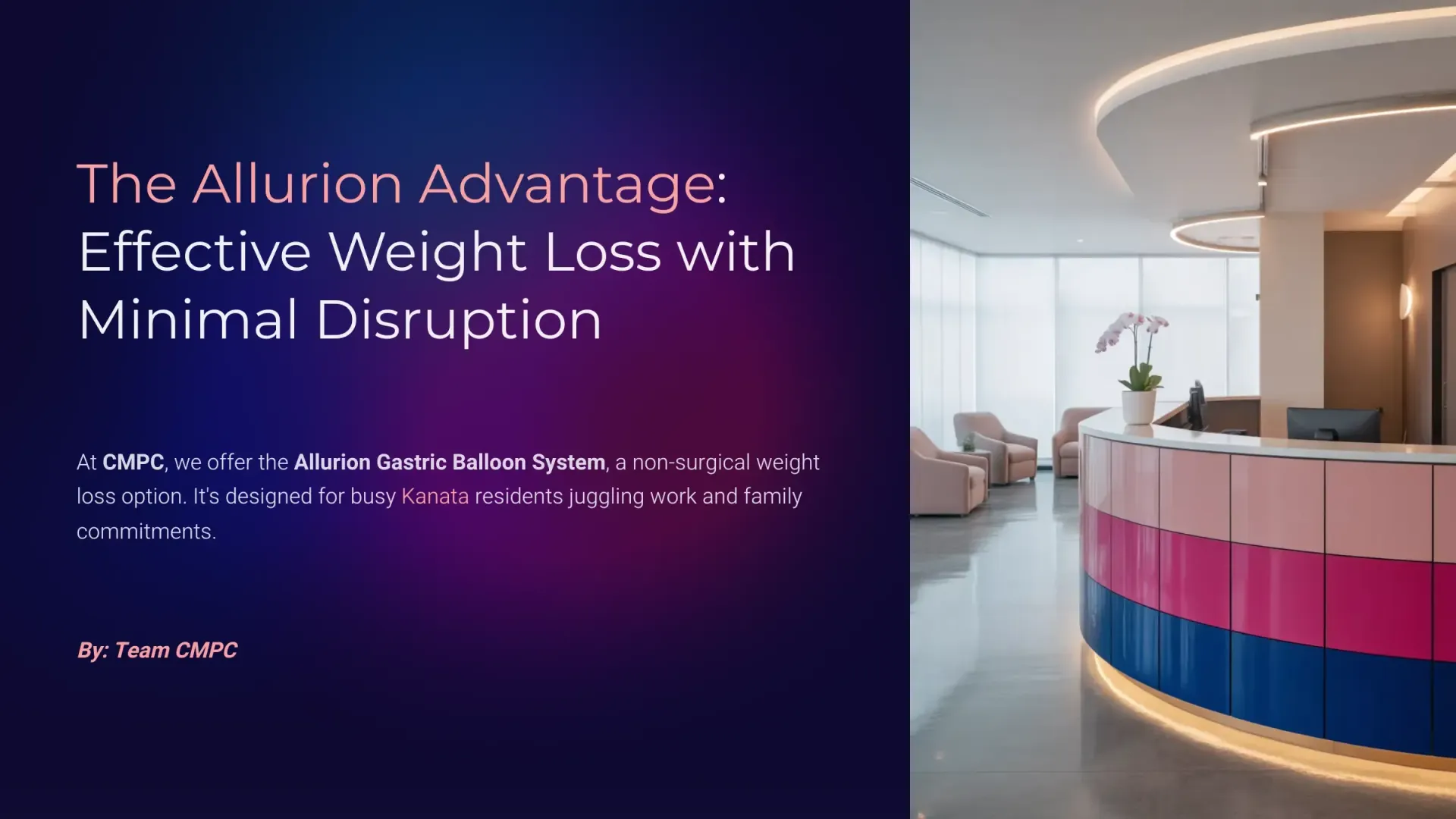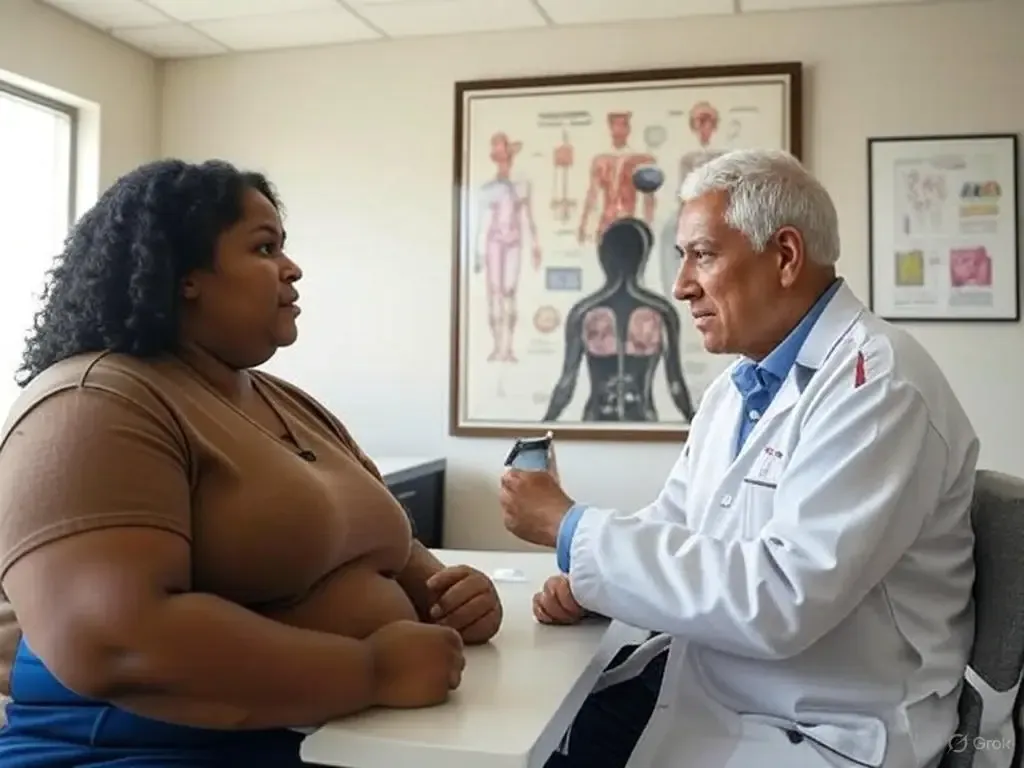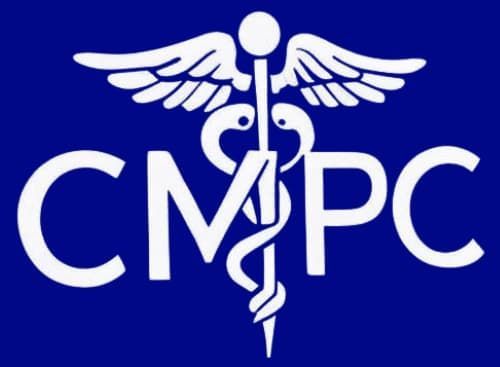
If you're exploring medical weight loss options in Kanata, you probably have valid worries about how possible side effects could affect your everyday life. This is a common inquiry we receive at CMPC and is a crucial aspect to consider. Enhancing your health through weight management is advantageous, but comprehending how treatments might briefly interfere with your routine aids in effective planning and setting achievable expectations.
As medical specialists in weight management, we have successfully supported numerous patients in their weight loss efforts. We are dedicated to offering transparent information about how different medical approaches may influence your daily activities while also emphasizing solutions that reduce these effects.
How Different Medical Weight Loss Approaches Impact Daily Life
Medical weight loss encompasses a spectrum of interventions, from minimally invasive options to more intensive surgical procedures. Each approach carries distinct considerations for your daily routine.
Prescription Weight Loss Medications and Your Daily Schedule
Weight loss medications are commonly prescribed for eligible patients with high BMI. While effective for many, they can cause side effects that temporarily affect your routine:
- Gastrointestinal adjustments: Many medications cause initial digestive changes like nausea, gas, or altered bowel habits. This might mean planning bathroom access during the first few weeks, especially during work hours or social outings. For instance, many of our patients report needing to locate restrooms in advance when attending events or meetings during the first 7 to 14 days on medication.
- Energy fluctuations: Some medications temporarily affect energy levels as your body adjusts. You might need to modify exercise intensity or schedule demanding tasks during energy peaks. One of our patients, a teacher, found that scheduling her medication dose timing to align with her teaching schedule helped manage energy dips more effectively.
- Sleep pattern changes: Certain weight loss medications influence sleep quality or patterns. This might require adjusting bedtime routines or allowing for additional rest during the adaptation period. Creating a consistent sleep schedule and relaxation ritual can help minimize these disruptions.
- Hydration needs: Many experience dry mouth or increased thirst with weight loss medications. Carrying water and scheduling regular hydration breaks becomes essential. A marked water bottle with time indicators can help ensure consistent daily hydration.
- Focus and concentration effects: Some patients report temporary headaches or focus changes, which may require adjustments for detail-oriented tasks. If you have important presentations or time-pressure projects, scheduling them around your medication adjustment period can be helpful.
For most patients, these side effects diminish significantly after 2 to 4 weeks as the body adapts to the medication. Planning for this initial adjustment period can help minimize disruption to your professional and personal routines.
Surgical Weight Loss Recovery and Activity Limitations
Bariatric surgical procedures involve more significant recovery considerations that will temporarily affect your daily activities:
- Initial recovery timeframe: Most surgical approaches require 2 to 4 weeks from work and everyday activities. This means arranging time off, helping with household responsibilities, and postponing specific social commitments. We recommend preparing meals in advance, setting up a recovery area in your home, and arranging for assistance with errands and childcare if needed.
- Physical limitations: Lifting restrictions (typically nothing heavier than 10 to 15 pounds) remain in place for approximately 6 weeks. This affects everything from grocery shopping to picking up children or pets. Several patients temporarily reorganize their homes to avoid lifting needs during recovery.
- Dietary progression requirements: It helps to follow a strict phase-based diet for meal planning, social dining, and food-related activities. The progression typically moves from clear liquids to pureed foods, soft foods, and regular textures over several weeks. It requires planning for family meals, workplace lunches, and social events.
- Energy conservation needs: Fatigue and reduced stamina occur daily during the early recovery, necessitating activity pacing and prioritization. Creating a modified daily schedule incorporating rest periods can help manage energy effectively.
- Medical follow-up commitments: Multiple appointments for monitoring and adjustments require time away from work or other responsibilities. Scheduling these appointments strategically (perhaps at the beginning or end of the workday) can minimize disruption.
Most patients find that many everyday activities can resume after the initial 4 to 6-week recovery period, though dietary changes and specific physical adaptations continue to evolve over several months.

The Allurion Advantage: Minimal Disruption to Your Lifestyle
At CMPC, we specialize in the Allurion Gastric Balloon System, which offers effective weight loss with significantly fewer disruptions to your daily activities than traditional approaches.
The Allurion Balloon Placement Experience
The Allurion Gastric Balloon placement process is remarkably convenient for busy Kanata residents:
- Simple office visit procedure: Unlike surgical options, the balloon is placed during a brief office visit where you swallow a capsule attached to a thin tube. The appointment typically takes less than 30 minutes, allowing you to schedule it during a lunch break or before or after work.
- No surgery or endoscopy required: The procedure eliminates the need for surgical recovery, incisions, or invasive endoscopy. There are no physical restrictions afterward related to wound healing or surgical recovery.
- No sedation is necessary: You remain fully alert throughout, meaning you can drive yourself to and from the appointment. This eliminates needing someone to accompany you and takes time away from their schedule.
- Minimal time investment: Most patients return to work the next day, with many returning the same day. A software developer we treated recently had his balloon placed on Friday morning and was back to his regular work schedule on Monday without issue.
- Quick confirmation process: A simple X-ray confirms proper placement. This takes moments and provides immediate verification that the balloon is correctly positioned.
Most of our patients only need to arrange a half-day absence from work for the placement, with minimal additional time required for follow-up visits.
Your First Week With the Allurion Balloon: What to Expect
While the Allurion system causes minimal overall disruption, the first week does require some adjustments:
- Initial adjustment sensations: Most patients experience fullness, occasional nausea, or stomach cramps during the first 3 to 7 days as the body adapts to the balloon's presence. These sensations typically peak around days 2 to 3 and then begin to subside. Many patients find that placing the balloon just before a weekend allows them to manage these initial sensations during non-work days.
- Physical accommodation period: Your stomach needs to adjust to the balloon's presence, creating a temporary heaviness or pressure sensation. This adjustment happens naturally and typically resolves within a week. Wearing looser clothing and avoiding strenuous physical activity during this initial week can increase comfort.
- Dietary adaptation phase: Starting with liquids and gradually progressing to regular foods helps minimize discomfort. Most patients follow a simple progression: clear liquids on day 1, full liquids on days 2 to 3, pureed foods on days 4 to 5, and soft foods on days 6 to 7. Most can resume normal food textures with smaller portions by the second week.
- Hydration focus necessity: Staying well-hydrated becomes particularly important, but it requires sipping water between meals rather than with food. Reminder apps or setting regular water break alarms can help establish this new habit.
- Symptom management measures: Anti-nausea medications or acid reducers may be temporarily needed but are typically not required beyond the first week. Having these medications readily available, even if not needed, provides peace of mind during the adjustment period.
For busy professionals, these first-week adjustments are typically manageable with minimal impact on work productivity, especially when weekend placement is scheduled. Many patients report that the sensations are milder than expected and less disruptive than they had anticipated.
Weeks 2 to 16: Living Normally With the Allurion Balloon
After the initial adjustment period, most patients experience minimal disruption to daily activities:
- Physical activity normalization: Regular exercise, including moderate to vigorous activity, can typically resume after the first week. Many of our active patients return to running, cycling, or gym workouts with only minor modifications to intensity during weeks 2 to 3.
- Work performance stabilization: Concentration, energy levels, and overall work capacity generally return to normal or improve after the adjustment period. The gradual, consistent weight loss often increases energy and improves focus.
- Social dining adaptations: Restaurant meals and social gatherings remain possible with smaller portions and more mindful eating practices. Many patients develop simple strategies like ordering appetizers as main courses, sharing entrees, or requesting to-go containers at the meal's start.
- Travel capability: No restrictions exist on travel, though planning meals and hydration becomes essential. We provide our patients with travel tips, including portable healthy snack options and strategies for managing meal times during different time zones.
- Sleep pattern normalization: Any initial discomfort affecting sleep typically resolves after the first week. Many patients report improved sleep quality as weight loss progresses, particularly those who previously experienced sleep apnea symptoms.
Throughout the 16-week program, most patients maintain their everyday work and social schedules with only minor modifications to eating habits. The balloon becomes a helpful tool that works in the background of daily life rather than a treatment that disrupts it.
Managing Specific Daily Activities During Medical Weight Loss Treatment
Professional Life and Work Performance
Medical weight management treatments affect work performance differently depending on your occupation and the specific intervention chosen:
- Office-based professional roles: Typically experience minimal disruption with non-surgical options like Allurion. The primary adjustments involve meal timing and potentially scheduling short breaks for hydration or medication. For instance, an accountant we treated during tax season could maintain her demanding schedule with only minor meal timing adjustments.
- Physically demanding occupations: May require temporary modifications, especially following surgical interventions or during the initial Allurion adjustment period. Construction workers, landscapers, or others with physically demanding jobs might need 1 to 2 weeks of modified duties following balloon placement, compared to 4 to 6 weeks after surgery.
- Customer-facing service positions: Some patients initially feel self-conscious about dietary changes in social settings, though this typically resolves quickly. Sales professionals or others who regularly attend business lunches often develop discreet strategies for managing smaller portions without drawing attention.
- High-stress executive functions: May notice fluctuations in energy levels during initial adjustment periods, requiring strategic scheduling of demanding tasks or presentations. Executive coaching can help develop stress management techniques during the adaptation phase.
- Travel-intensive career requirements: Careful planning for medication timing, food choices, and follow-up appointments is vital. We provide specialized guidance for our frequent travel patients, including strategies for healthy airport food choices and maintaining treatment consistency across time zones.
Flexible scheduling during initial adjustment periods can benefit the many technology professionals working in business parks. Many employers are supportive once they understand the temporary nature of any potential impacts.
Exercise Routines and Physical Activities
Physical activity remains an essential component of successful weight management, but adjustments may be necessary:
- Initial exercise modification needs: Most weight loss interventions require temporarily reducing exercise intensity for a short period. With the Allurion balloon, this typically means 5 to 7 days of lighter activity before resuming regular exercise, compared to weeks or months with surgical options.
- Progressive activity reintroduction approach: Building back to previous activity levels under medical guidance follows a specific timeline. We provide patients personalized exercise progression plans that safely increase intensity and duration based on their recovery and adaptation.
- Alternative exercise exploration opportunities: Some patients discover different activities that are more comfortable during treatment. Water-based exercises like swimming or aqua fitness often feel exceptionally cozy with the Allurion balloon, as the buoyancy reduces pressure sensations.
- Enhanced hydration requirements: Exercise hydration needs often increase during weight loss treatment. We recommend specific hydration protocols before, during, and after workouts to maintain comfort and performance.
- Energy level fluctuation management: Adjusting workout timing may be required to match energy peaks. Many patients find morning workouts most effective during treatment, before meals, and during daily activities, potentially depleting energy.
- Workout intensity expectation adjustment: Understanding that temporary performance plateaus or slight decreases are normal during adaptation. Tracking metrics beyond performance (such as consistency, enjoyment, or stress reduction) helps maintain motivation during this period.
We provide residents customized physical activity guidelines for their treatment plans, fitness levels, and preferences. These plans emphasize maintaining consistency while adapting expectations during the treatment period.
Social and Family Interactions
Weight loss treatments can temporarily impact social interactions and family responsibilities:
- Restaurant dining strategy development: It's great to research suitable menu and portion control strategies. Many restaurants offer health-conscious options, and we provide patients with specific recommendations for local establishments that accommodate dietary needs discreetly.
- Family meal adaptation considerations: Making potential adjustments to cooking and eating habits for the entire household is helpful. Several families find that healthier eating patterns benefit everyone, not just those undergoing treatment. We offer family-friendly recipes and meal-planning suggestions that satisfy diverse preferences.
- Social event participation planning: Particularly for gatherings centred around food and alcohol. Strategies include eating a small protein, having a rich snack before events, volunteering as the designated driver to explain abstaining from alcohol, and focusing on the social aspects rather than the food.
- Relationship dynamic evolution awareness: Possible effects on energy levels and body image during transition. Communication with partners about temporary changes and expectations helps maintain relationship quality during treatment.
- Childcare responsibility management: It may be challenging during initial recovery periods for surgical options. The Allurion system's minimal recovery needs make it particularly suitable for busy parents who cannot arrange extended childcare.
- Special occasion celebration adaptation: Developing alternative ways to celebrate that don't center on food. Many patients discover non-food rewards that become meaningful new traditions for marking achievements and special occasions.
Our CMPC team offers specific guidance to help local folks navigate these social situations while staying committed to their weight loss goals. Many patients report that these situations become easier to manage over time as they develop confidence in their new habits.
Strategic Treatment Timing Selection
Choosing the optimal timing for your weight loss intervention can significantly reduce disruption to essential activities:
- Work schedule consideration factors: Planning around major projects or naturally lighter periods. Those patients in the technology sector choose to begin treatment during quarterly transitions or between primary project cycles.
- Social calendar assessment benefits: Avoiding treatment near important events or celebrations allows you to participate fully in significant occasions. We recommend reviewing your calendar for 3 to 4 months when scheduling treatment start dates.
- Seasonal timing advantages: Some patients prefer winter when outdoor social gatherings are less frequent. Others find summer optimal as fresh produce is abundant and outdoor activity options increase.
- Support availability coordination: Ensuring family or friends can assist during adjustment periods improves the experience. Identifying specific support needs and confirming availability in advance prevents last-minute challenges.
- Follow-up appointment scheduling efficiency: Clustering these with other commitments minimizes time away from work. Patients appreciate our extended hours, which allow for appointments before or after standard work hours.
- Professional deadline consideration importance: Avoiding treatment initiation immediately before major presentations or deadlines reduces stress. Creating a timeline that maps treatment phases against known work commitments helps identify the optimal starting window.
For the local community with seasonal work demands, our clinic locations offer flexible scheduling options throughout the year, including evening appointments to accommodate diverse work schedules.
Effective Communication Planning
Open communication with key people in your life can ease the transition:
- Workplace discussion approach recommendations: Informing supervisors about potential brief accommodation needs without oversharing personal health details. Many patients find that framing the conversation around scheduling flexibility rather than medical information maintains appropriate privacy while securing needed accommodations.
- Family involvement benefits maximization: Helping loved ones understand how to support your journey creates a positive environment for success. Family education sessions can help everyone understand the importance of their support role.
- Social circle awareness level determination: Sharing as much or as little as you're comfortable with helps manage social situations. Preparing brief, positive responses to questions about dietary changes can reduce awkwardness in social settings.
- Healthcare team coordination importance : Keeping all providers informed about your treatment ensures consistent care. Providing your primary care physician with updates about your weight loss treatment helps coordinate overall healthcare.
- Support group connection advantages: Linking with others undergoing similar experiences provides practical strategies and emotional support. Online and in-person support communities specific to your treatment type offer valuable peer wisdom.
- Response preparation for questions: Having ready answers for common questions about dietary changes or weight loss prevents being caught off guard. Simple, positive responses like "I'm making some health changes right now" often satisfy curiosity without inviting unwanted advice.
Most patients find that selective sharing about their weight loss journey facilitates needed support while maintaining privacy about medical details. Finding the right balance is a personal decision we help each patient navigate.
Practical Daily Management Techniques
Specific strategies can minimize the impact of weight loss treatment side effects:
- Meal planning and preparation organization: Appropriately available foods prevent hunger-driven off-plan choices. Weekend meal preparation sessions can stock your refrigerator with convenient, treatment-appropriate options for busy weekdays.
- Hydration scheduling system implementation: Setting reminders to drink water between meals ensures adequate hydration. Smart water bottles with time markers or hydration reminder apps help establish consistent habits.
- Medication timing optimization approach: Working with your provider to minimize interference with key activities improves the treatment experience. Medications can often be scheduled to align with natural breaks in your day or when side effects would be least disruptive.
- Rest period allocation strategy: Scheduling short breaks during the day as needed prevents fatigue from accumulating. Even 5 to 10-minute microbreaks can help manage energy levels during the adaptation phase.
- Symptom tracking method adoption: Identifying patterns to manage side effects proactively improves daily comfort. Digital or paper tracking tools help recognize trends and communicate effectively with your healthcare team.
- Wardrobe transition planning: Having clothing options for different stages of weight loss prevents discomfort. Investing in key transitional pieces with adjustable features can bridge the gap between clothing sizes.
- Calendar blocking for self-care: Designating specific times for meal preparation, exercise, and rest ensures these priorities aren't overlooked. Treating these appointments with yourself as non-negotiable improves consistency.
Our expert team provides local patients personalized management plans that accommodate their unique daily routines and preferences. These practical strategies transform potentially disruptive side effects into manageable adjustments.
Special Considerations for Different Lifestyles
Parents and Caregivers
Those with dependent care responsibilities face unique considerations:
- Childcare arrangement planning necessity: Preparing for childcare in post-surgery situations is crucial. However, with Allurion, these are minimal. Having backup care options identified, even if not needed, provides peace of mind.
- Meal preparation balance achievement: Managing different nutritional needs within the household requires thoughtful planning. Creating meals with a standard base that can be customized to different needs simplifies kitchen time while meeting everyone's requirements.
- Energy conservation strategy implementation: Prioritizing essential caregiving activities during lower energy periods preserves family harmony. Creating a hierarchy of necessary versus optional activities helps focus limited energy on what matters most.
- Role modelling opportunity utilization: Using the experience to demonstrate healthy habits for children or dependents creates positive family patterns. Openly discussing health goals in age-appropriate ways helps children understand positive health behaviours.
- Family activity modification exploration: Involving everyone in appropriate physical activities strengthens family bonds while supporting weight loss. Family walks, active game nights, or backyard sports benefit family time and physical activity.
- Mealtime routine consistency maintenance: Maintaining family meal traditions while adapting food choices provides stability. The ritual and connection of family meals remain essential even as the menu evolves.
We offer local families specific guidance on managing weight loss treatment while maintaining caregiving responsibilities, recognizing that family needs vary widely and require personalized approaches.
Active Professionals
Those with demanding careers can maintain productivity with proper planning:
- Meeting scheduling strategic planning: Avoiding important presentations during initial adjustment periods prevents potential performance impacts. Reviewing work calendars and treatment timelines together identifies optimal scheduling patterns.
- Workstation modification considerations: Ensuring comfort during the workday may include keeping appropriate snacks accessible or having water readily available. Standing desk options can also help manage physical comfort during treatment.
- Commute considerations and planning: Managing potential urgent bathroom needs during longer commutes requires route planning. Mapping available facilities along common routes provides security during the adjustment period.
- Business travel strategy development: Maintaining treatment protocols while away requires preparation. Travel kits with appropriate snacks, medication management plans, and restaurant research for destinations support treatment continuity.
- Professional disclosure decision-making process: Determining what, if anything, to share with colleagues respects personal privacy while securing needed accommodations. Many professionals share minimal information on a need-to-know basis.
- Productivity tool utilization: Using the scheduling and reminder tools to manage treatment-related tasks minimizes workflow disruption. Digital tools can discreetly manage medication timing, hydration reminders, or meal scheduling.
Our location serves many local professionals from the surrounding technology parks who successfully balance career demands with weight loss treatment through thoughtful planning and strategic adjustments.
Students
Students can maintain academic performance during weight loss treatment:
- Academic calendar alignment planning: Scheduling interventions during breaks when possible maximizes recovery time without academic impact. Reviewing syllabi and identifying high-demand academic periods helps optimize treatment timing.
- Study schedule adjustment implementation: Working around peak energy periods maximizes cognitive performance. Tracking energy patterns and scheduling challenging academic work during peak times improves efficiency.
- Campus resource identification process: Locating suitable food options and medical support creates a supportive environment. Many campuses offer healthy dining options that can accommodate specific dietary needs with planning.
- Professor communication approach consideration: Discreet disclosure if accommodations might be needed prevents academic complications. Most educational institutions have processes for medical accommodations that don't require detailed health information sharing.
- Examination period planning importance: Ensuring treatment stability during critical academic evaluations protects educational outcomes. Avoiding major treatment transitions immediately before exams reduces unnecessary stress.
- Social pressure management strategy development: College environments often include food and alcohol-centered social activities. Having predetermined strategies for navigating these situations maintains social connections while supporting treatment goals.
CMPC works with many students from educational institutions to develop treatment plans that support their academic success while effectively managing weight.
When to Seek Additional Support
While most side effects are manageable, certain situations warrant contacting your healthcare provider:
- Severe or persistent symptom experiences: Particularly those affecting basic functioning beyond expected adjustment periods. Symptoms that don't follow the predicted improvement pattern deserve prompt medical attention.
- Hydration maintenance difficulty: The inability to maintain adequate fluid intake is a medical priority requiring immediate attention. Signs of dehydration, such as dark urine, dizziness, or extreme thirst, should prompt contact with your provider.
- Essential responsibility interference concerns: Significant impacts on work, education, or caregiving may indicate the need for treatment adjustment. Most side effects should be manageable enough to maintain essential functions with minor accommodations.
- Psychological distress development: Depression, anxiety, or body image concerns affecting daily life require professional support. Emotional well-being is an essential component of successful weight management.
- Pain beyond expected discomfort levels could indicate complications requiring evaluation and shouldn't be ignored. Understanding the difference between expected discomfort and concerning pain is essential.
- Medication side effect escalation: Increasing rather than decreasing side effects may indicate the need for adjustment. Most medication side effects follow a pattern of peaking and then gradually subsiding.
We are readily available to local patients experiencing concerns about treatment effects on daily activities, with same-day consultation options for urgent problems.
Embracing the Transition Journey
Remember that most disruptions to daily activities are temporary and represent a transition to improved health:
- Progressive improvement expectation setting: Side effects typically diminish as your body adapts to treatment. Understanding the typical timeline helps maintain perspective during challenging days.
- New normal development process appreciation: Healthier habits become routine with time and consistent practice. What initially feels like disruption gradually transforms into comfortable new patterns.
- Benefits realization timeline understanding: Energy improvements and mobility gains often begin to outweigh temporary disruptions within weeks. Many patients report a crossover point where the positive changes become more noticeable than the adjustments.
- Perspective maintenance practice: Focusing on long-term health benefits during challenging moments supports perseverance. Creating visual reminders of your health goals can motivate you during adjustment periods.
- Success celebration importance: Acknowledging milestones along your weight management journey reinforces positive changes. Recognizing non-scale victories such as improved energy, better sleep, or increased physical capacity provides motivation.
- Identity expansion exploration: Seeing yourself as someone who prioritizes health becomes increasingly natural. This identity shift often becomes one of the most rewarding aspects of the weight loss journey.
Our patients from the local communities consistently report that the temporary adjustments required during medical weight loss treatment were worthwhile investments in their improved quality of life and health outcomes.
The CMPC Difference: Comprehensive Support for Kanata Residents
We understand that people have busy lives that can't be put on hold for weight loss treatment.
Our approach includes:
- Personalized treatment selection guidance: Recommending interventions that align with your lifestyle and minimize disruption. Our comprehensive assessment process considers your specific daily activities and responsibilities.
- Proactive side effect management protocols: Preventing or minimizing disruptions before they occur through anticipatory planning. Preventive strategies often prove more effective than reactive management.
- Flexible appointment scheduling availability: Accommodating work and family commitments with extended hours and efficient visits.
- Ongoing communication access assurance: Providing support between formal appointments through secure messaging and telehealth options. Questions or concerns can be addressed promptly without waiting for scheduled appointments.
- Adjustment strategy development collaboration: Creating specific plans for significant life events during treatment ensures success in all areas. From business travel to family celebrations, we help develop strategies for managing these situations while maintaining treatment consistency.
- Community resource connection facilitation: Linking patients with local support options for their needs enhances outcomes. We suggest numerous resources for healthy meal options, physical activity, and support groups that complement medical treatment.
This comprehensive support system helps minimize disruptions to daily life while maximizing weight loss success, allowing you to focus on your health without sacrificing other priorities.
Your Journey to Better Health Starts Here
Understanding how medical weight loss might affect your daily activities is vital in preparing for a successful journey. Most patients find that with proper planning and support, these effects are manageable and temporary, while the health benefits are substantial and lasting.
Suppose concerns about disruption to your daily life have been holding you back from addressing weight-related health issues. In that case, we encourage you to explore the Allurion Gastric Balloon System at CMPC.
This non-surgical option offers effective weight loss with minimal impact on your daily routine, allowing you to continue working, parenting, studying, or pursuing your passions while achieving your health goals.
You may wish to read "Could the treatment harm my other organs?" to address another common concern about weight loss treatments.
Ready to discuss how medical weight loss can fit into your busy Kanata lifestyle?
Contact CMPC today to schedule your consultation. Our experienced team will help you understand all available options, address your specific concerns about daily life disruptions, and develop a personalized plan that supports both your weight loss goals and your active lifestyle.
Don't let worries about temporary side effects prevent you from taking control of your health. Call us NOW to begin your journey toward a healthier weight and enhanced quality of life.










